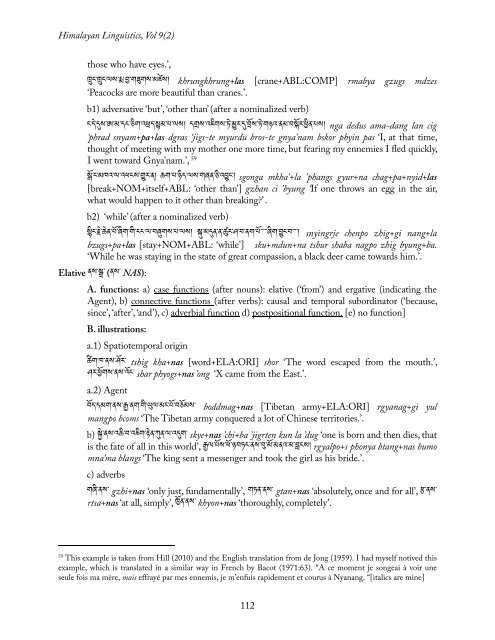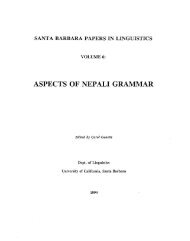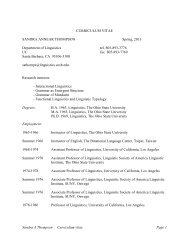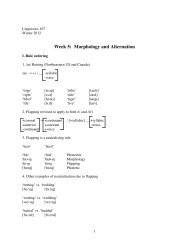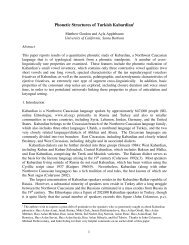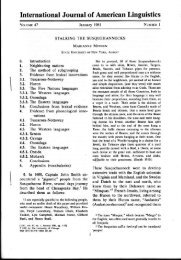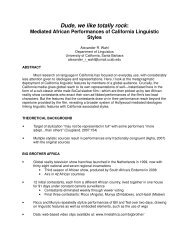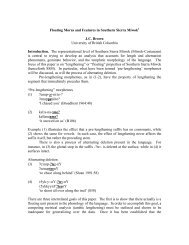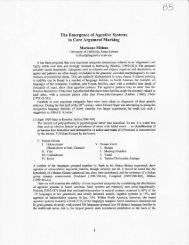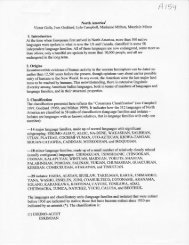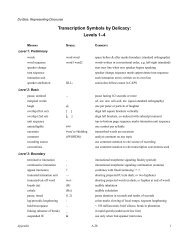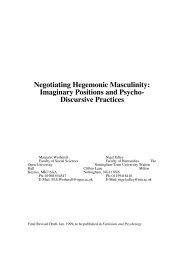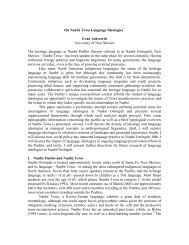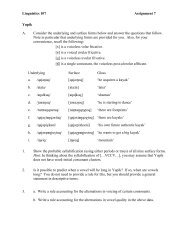The Classical Tibetan cases and their transcategoriality
The Classical Tibetan cases and their transcategoriality
The Classical Tibetan cases and their transcategoriality
You also want an ePaper? Increase the reach of your titles
YUMPU automatically turns print PDFs into web optimized ePapers that Google loves.
Himalayan Linguistics, Vol 9(2)<br />
those who have eyes.’,<br />
ཁྲུང་ཁྲུང་ལས་རྨ་ བྱ་གཟུགས་མཛེས། khrungkhrung+las [crane+ABL:COMP] rmabya gzugs mdzes<br />
‘Peacocks are more beautiful than cranes.’.<br />
b1) adversative ‘but’, ‘other than’ (after a nominalized verb)<br />
ང་དེ་དུས་ཨ་མ་དང་ཅིག་འཕྲད་སྙམ་པ་ལས། དགྲས་འཇིགས་ཏེ་མྱུར་དུ་བྲོས་ཏེ་གཉའ་ནམ་བསྐོར་ཕྱིན་པས། nga dedus ama-dang lan cig<br />
‘phrad snyam+pa+las dgras ‘jigs-te myurdu bros-te gnya’nam bskor phyin pas ‘I, at that time,<br />
thought of meeting with my mother one more time, but fearing my ennemies I fled quickly,<br />
I went toward Gnya’nam.’, 59<br />
སྒོ་ང་མཁའ་ལ་འཕངས་གྱུར་ན། ཆག་པ་ཉིད་ལས་གཞན་ཅི་འབྱུང༌། sgonga mkha’+la ’phangs gyur+na chag+pa+nyid+las<br />
[break+NOM+itself+ABL: ‘other than’] gzhan ci ’byung ‘If one throws an egg in the air,<br />
what would happen to it other than breaking?’ .<br />
b2) ‘while’ (after a nominalized verb)<br />
སྙིང་རྗེ་ཆེན་པོ་ཞིག་གི་ངང་ལ་བཞུགས་པ་ལས། སྐུ་མདུན་ན་ཚུར་ཤ་བ་ནག་པོ་་་་་ཞིག་བྱུང་བ་་་་། snyingrje chenpo zhig+gi nang+la<br />
bzugs+pa+las [stay+NOM+ABL: ‘while’] sku+mdun+na tshur shaba nagpo zhig byung+ba.<br />
‘While he was staying in the state of great compassion, a black deer came towards him.’.<br />
Elative ནས་སྒྲ་ (ནས་ NAS):<br />
A. functions: a) case functions (after nouns): elative (‘from’) <strong>and</strong> ergative (indicating the<br />
Agent), b) connective functions (after verbs): causal <strong>and</strong> temporal subordinator (‘because,<br />
since’, ‘after’, ‘<strong>and</strong>’), c) adverbial function d) postpositional function. [e) no function]<br />
B. illustrations:<br />
a.1) Spatiotemporal origin<br />
ཚིག་ཁ་ནས་ཤོར་ tshig kha+nas [word+ELA:ORI] shor ‘<strong>The</strong> word escaped from the mouth.’,<br />
ཤར་ཕྱོགས་ནས་འོང་ shar phyogs+nas ’ong ‘X came from the East.’.<br />
a.2) Agent<br />
བོད་དམག་ནས་རྒྱ་ནག་གི་ཡུལ་མང་པོ་བཅོམས་ boddmag+nas [<strong>Tibetan</strong> army+ELA:ORI] rgyanag+gi yul<br />
mangpo bcoms ‘<strong>The</strong> <strong>Tibetan</strong> army conquered a lot of Chinese territories.’.<br />
b) སྐྱེ་ནས་འཆི་བ་འཇིག་རྟེན་ཀུན་ལ་འདུག་ skye+nas ’chi+ba ’jigrten kun la ’dug ‘one is born <strong>and</strong> then dies, that<br />
is the fate of all in this world’, རྒྱལ་པོས་ཕོ་ཉ་བཏང་ནས་བུ་མོ་མནའ་མ་བླངས། rgyalpo+s phonya btang+nas bumo<br />
mna’ma blangs ‘<strong>The</strong> king sent a messenger <strong>and</strong> took the girl as his bride.’.<br />
c) adverbs<br />
གཞི་ནས་ gzhi+nas ‘only just, fundamentally’, གཏན་ནས་ gtan+nas ‘absolutely, once <strong>and</strong> for all’, རྩ་ནས་<br />
rtsa+nas ‘at all, simply’,་ཁྱོན་ནས་ khyon+nas ‘thoroughly, completely’.<br />
59 This example is taken from Hill (2010) <strong>and</strong> the English translation from de Jong (1959). I had myself notived this<br />
example, which is translated in a similar way in French by Bacot (1971:63). “A ce moment je songeai à voir une<br />
seule fois ma mère, mais effrayé par mes ennemis, je m’enfuis rapidement et courus à Nyanang. “[italics are mine]<br />
112


